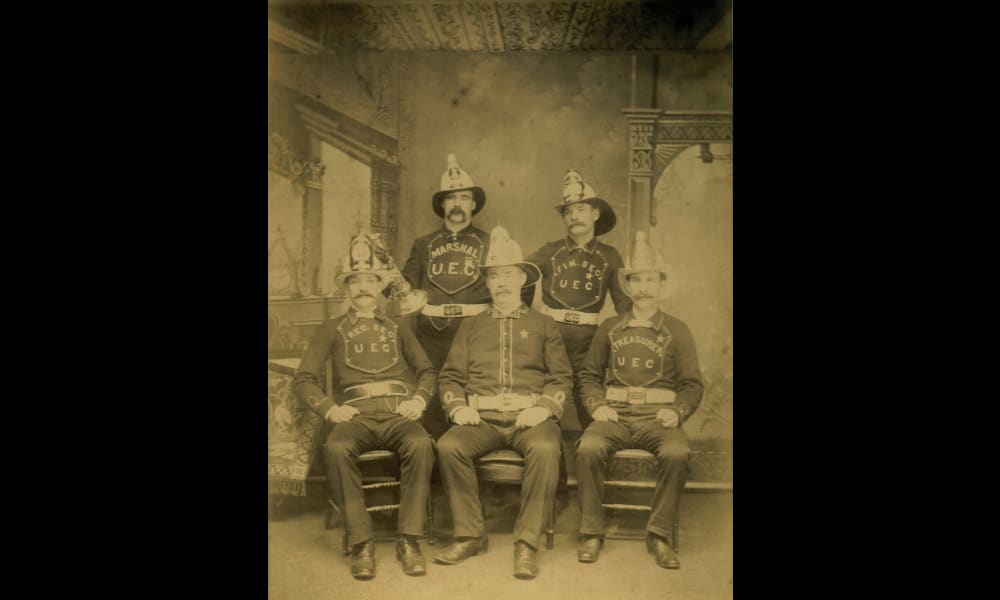If you pick up a history book about the history of Halifax or the fire service in Nova Scotia, you will read that the Union Engine Company (U.E.C.) was founded on August 8, 1768. However, it seems that this information might not be factual. Below is the text of the 1783 amendment, followed by solid arguments in favour of the 1783 scenario.
WHEREAS it is highly necessary, that the fire engine be constantly kept in good order, and that a number of prudent persons be appointed for that purpose:
- Be it enacted by the Governor, Council, and Assembly, That it shall and may be lawful for the Justices in their Sessions of the Peace for the town and county of Halifax; and they are hereby required to appoint such number of prudent persons, not exceeding nine, who shall be denominated Engine Men, and shall have charge of the town engine, and shall be obliged to keep the same in good order and fit for service on all occasions; and that the said persons so chosen, shall be exempted from serving on juries, or the office of Constable during their continuance in said office.
- And be it enacted, That at the time of breaking forth of fire in the said town, or suburbs, the said Engine Men shall repair to the engine, and use their utmost efforts in taking it to the place where the fire shall be discovered, and there work the same, according to their best skill and judgement, and the directions of the Firewards for extinguishing any fire so broke out.
- And be it also enacted, That one of the Engine Men, chosen as aforesaid, shall have the power of a Fireward to command any necessary assistance in taking the engine to and from the place of fire, and any persons refusing to obey such orders, shall be subject to the same fines as imposed by an Act made in the second year of His present Majesty’s reign, entitled, An Act for appointing Firewards, ascertain their Duty, and for punishing Thefts and Disorders at the time of Fire.
- And be it further enacted, That all necessary repairs to the said engine, shall be allowed and paid by assessment, under the order and direction of the Justices and Grand Jury in their General Quarter Sessions, to be levied on the Inhabitants of the town of Halifax (Province of Nova Scotia 1783, 234-235).
This amendment appeared in the Royal Gazette of December 30, 1783, by order of the Governor. A few points worth mentioning are arising from this amendment:
- The amendment is, for all intents and purposes, establishing an engine company. The statement: “Whereas it is highly necessary, that the fire engine be constantly kept in good order, and that a number of prudent persons be appointed for that purpose” meant that:
- There was at least one fire engine in the care the Town of Halifax, and
- Nobody was looking after said engine at the time, not even the engine workers alluded to in 1776, as it would have meant, at a minimum, using it occasionally to keep the pump in good working.
- The U.E.C.’s claim to have been founded in 1768 seems to have appeared for the first time in the company’s meeting minutes of September 16, 1845 (Nova Scotia Archives 1835-1846). No reference to the year 1768 was found in any existing document prior to that date.
- If the U.E.C. already existed at the time, as it would later be claimed, an act of the Legislature would have been unnecessary since these would have been the men maintaining the engine.
- The Act specifically limits the number of “Engine Men” to nine, which is identical to the number of individuals found in the Engine Company in 1789, prior to Captain Benjamin Bridge requesting an augmentation to fifteen men the same year. In his letter (Nova Scotia Archives), Bridge said that they were limited to nine men “by law”, the law, in this case, being the 1783 amendment to the Act of 1762.
- All other fire companies had between 30 to 40 members, even early on. In 1759, five years after its foundation the Union Fire-Club had 34 members (Bushell, The Rules and Orders of the Union Fire-Club 1759, p. 3), so it makes it unlikely that a fire company created in 1768 would only have had nine members twenty years later and still be active. Fighting a fire was labour intensive; a bucket line alone could have several hundreds of individuals, let alone the working of the engines and salvage operations.
- The Engine Company meeting minutes of 1789 (Nova Scotia Archives 1789-1807) explicitly say that they were appointed “by law to take care of the town engine”, which links directly to the above-mentioned amendment of the Act of 1762.
- The U.E.C. minutes of August 21, 1827, explains that "Wednesday, August 8 was the day appointed for the Company to celebrate their annual dinner. At 5 o'clock, the Company and number of respectable guests sat down to a sumptuous dinner [...]" And it goes on to say that they drank and sang and went home (Nova Scotia Archives 1826-1835). They did not allude to an anniversary, as they will later claim. In fact, the annual dinner was held anywhere in July or August. For instance, at the meeting of July 21, 1829, the minutes stated: “Motion. Moved by Mr. Muhlig, 2nd by Mr. McLean, that company have their Annual Dinner. Unanimously agreed.” followed by “Moved by Mr. Sutton and 2nd that Dinner take place the first Tuesday in August. Unanimously agreed” (Nova Scotia Archives 1826-1835). The first Tuesday of August 1829 was the 4th. Another example comes from the minutes of July 19, 1842: “A Special Meeting of this Comp. was held this evening, the Capt. stated that he had received a requisition from some of the members, asking him to call the Comp. together this evening to arrange for their annual festival & for these purposes. When on motion it was proposed & agreed unanimously that this comp have their pic-nic [sic] at Mr. Lowes on Thursday next 11th inst.,” that day being August 11, 1842 (Nova Scotia Archives 1835-1846).
- In 1828, the Magistrates of the Sessions decided to have the power to approve the appointment of officers in the U.E.C. The Company formed a committee to look at the implications of this decision, which is examined in a subsequent chapter, but we underline here an excerpt from the resolution passed shortly after, at a meeting of the U.E.C. It states: "Resolved that since the year 1783, this Company has been following that course, […]" (Nova Scotia Archives 1826-1835). The "course" refers to the ability ballot their officers, which again points to the foundation of the Union Engine Company in 1783, and not 1768.
And the last point is that a newspaper article that appeared in the Royal Gazette of March 11, 1783, before amendment was enacted, supports part of the first argument:
On Thursday morning last, between 8 and 9 o’Clock, a fire broke out in a Shop occupied by Mr. Johnson, in Barrington Street, which soon communicated to the adjoining House, both of which were consumed. The preservation of the whole Neighbourhood must be gratefully ascribed to the very spirited exertions of many of the inhabitants, who were kindly assisted by a number of Sailors belonging to the Merchantmen in this harbour.
Some Person having taken the liberty to carry away several Buckets belonging to the Town, are hereby notified, if they do not return them immediately, and they should afterwards be found in their possession, they will be rigorously prosecuted.
Although it could be debated that an omission does not equate an absence, there is no reference to any “firemen”, “engine” or “public departments”. The article is specific: the citizens of Halifax and a handful of sailors put the fire out. The equipment used at the fire (some of it stolen) was that of the town, as provided by the 1782 amendment of the act of 1762 (see page ).
Having said all that, remember the 1776 passage: “[…] to call the workers of the fire engine together in order to complete their number […]”. Where was the engine that day and was it still in existence?
As noted, prior to December 1793, the “Union Engine Company” was not used. Therefore, until we explore that period, the name “Fire Engine Company” will be used instead.
The Fire Engine Company ushered a new era into Halifax’s fire establishment as it was the only body operating an engine, along with those of the Military. The Company’s structure was completely different than that of the Union Fire-Club; they did not have a President, Vice-President, Secretary, or Treasurer. They had a Captain and a clerk, which suggests a military-like structure as opposed to that of a society.


